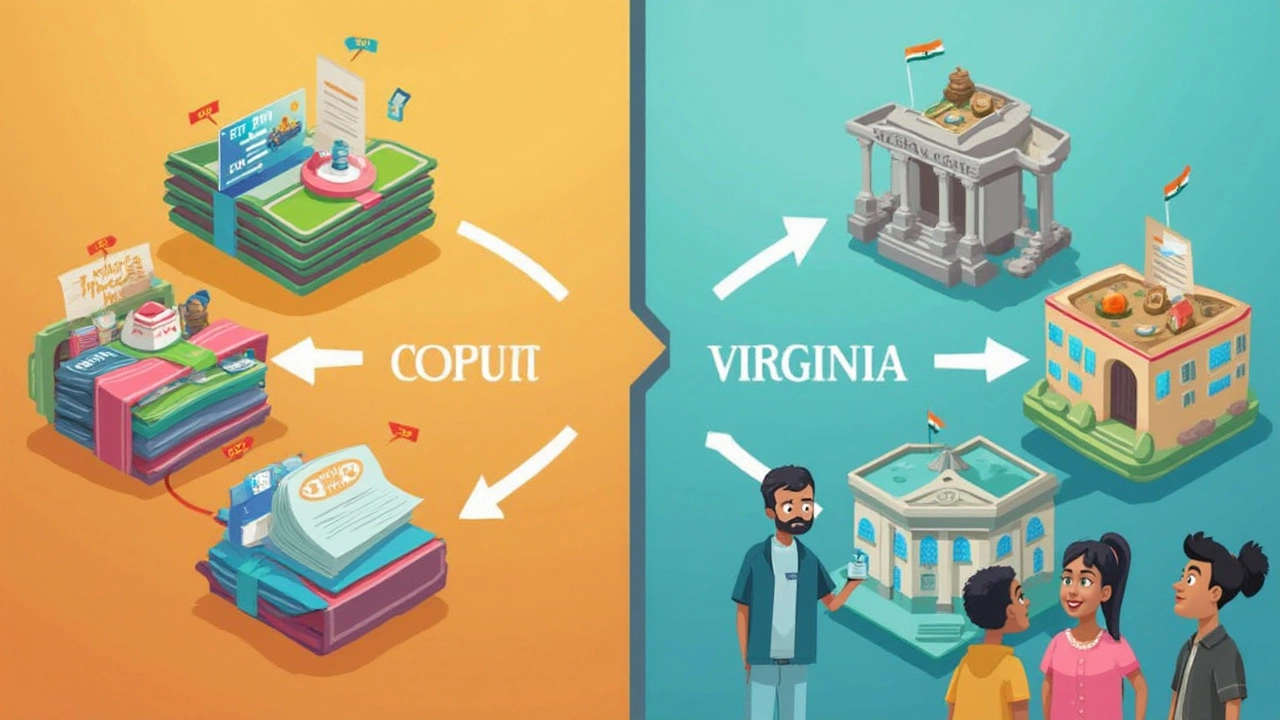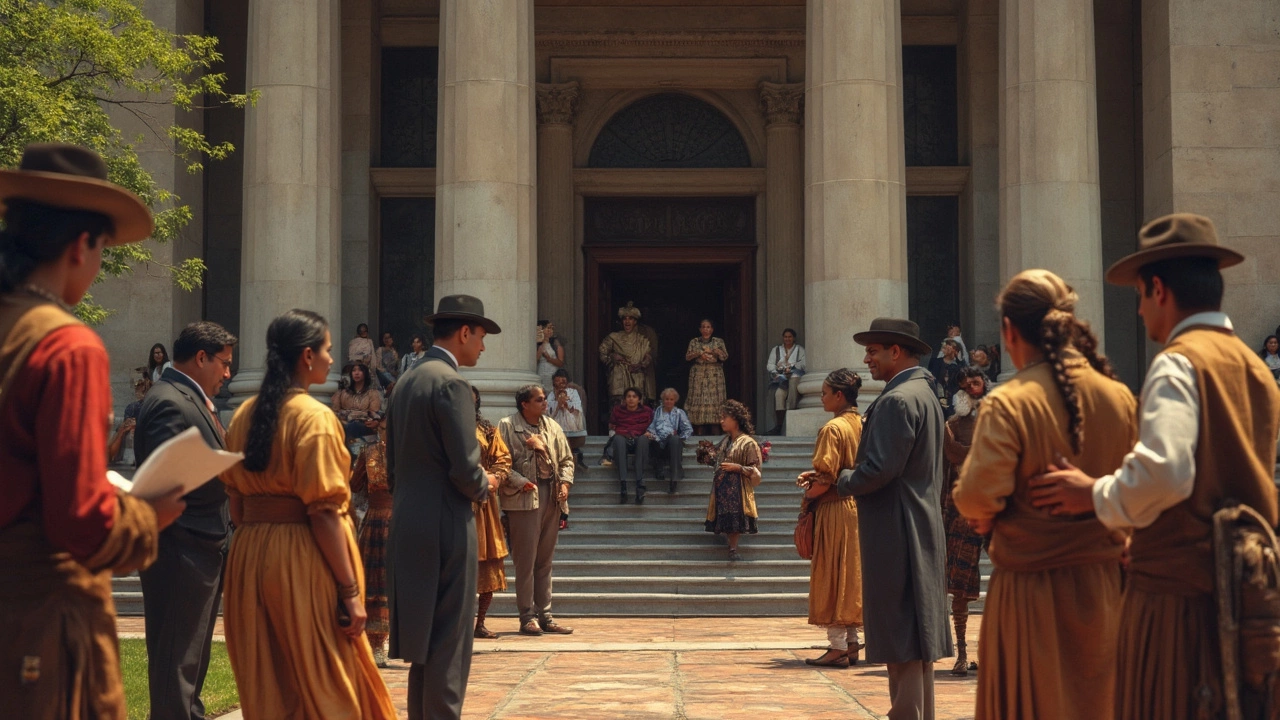Ever wondered which court actually hears your civil case in Virginia? It’s not as straightforward as you might think. Depending on the type of dispute—like unpaid rent, car repairs gone wrong, or a contract falling apart—you could end up in different courtrooms.
Virginia’s court system splits responsibilities. Some cases are quick, handled by judges who see these issues daily, while others demand a bigger stage with more at stake. If you pick the wrong place to file, your case can be thrown out before you even get a word in. Sounds frustrating, right?
This isn’t just about legal mumbo-jumbo. Knowing where to file can save you money, cut down on waiting time, and even boost your odds of getting a fair shake. Let’s untangle how civil cases move through the Virginia courts and what you need to watch for so you end up in the right spot from the first step.
- Breaking Down Virginia's Civil Court Structure
- General District Courts: The Everyday Option
- Circuit Courts: When Stakes Are Higher
- Small Claims Court: Fast Track for Minor Disputes
- Tips for Picking the Right Court in Virginia
Breaking Down Virginia's Civil Court Structure
If you’re looking to file or answer to a civil case in VA, you’ve got to know which court handles what. Skip this step, and you might be wasting time and money. Virginia sorts civil cases into three main court options: General District Court, Circuit Court, and Small Claims Court. Each of these courts deals with certain dollar amounts and types of problems.
- General District Court: Hears a big chunk of cases like unpaid bills, landlord-tenant disputes, or car accidents, mainly when the dollar value is under $25,000. This is where most folks start.
- Circuit Court: Handles the high-dollar stuff—disputes over $25,000 and those where someone wants a jury trial. It also hears appeals from General District Courts.
- Small Claims Court: Perfect for smaller dollar fights—$5,000 or less—often without lawyers. Fast, simple, and to the point.
Want numbers? In 2023, General District Courts in Virginia handled almost 700,000 civil filings. That’s a lot of “everyday” disagreements. Circuit Courts heard fewer cases, but those often came with higher stakes.
Here’s a quick look at what each court covers:
| Court Type | Typical Case Value | Examples Heard |
|---|---|---|
| General District | Up to $25,000 | Unpaid debts, eviction, minor contract fights |
| Circuit | Above $25,000 | Major contract disputes, personal injury over $25k, jury trials |
| Small Claims | Up to $5,000 | Security deposit returns, small businesses owed cash |
Different courts have their own rules, paperwork, and even hours. So make sure to check your local court’s website for specifics. Getting this right isn’t just a small detail—it can steer your case in a whole new direction.
General District Courts: The Everyday Option
If you’re dealing with most civil cases in VA, you’ll probably end up in a general district court. These courts are everywhere—one for almost every city and county, so you won’t have to drive hours just to get your day in court. Think of them as the everyday workhorses of Virginia’s court system, handling an enormous chunk of the routine stuff.
Here’s what’s special about general district courts: they can hear claims up to $25,000—but not more. If your lawsuit is about a car accident, unpaid rent, busted appliances, or something in that neighborhood and you’re claiming $25,000 or less, this is your arena.
The paperwork is lighter than in higher courts, and there’s usually no jury—just a judge who listens, decides, and keeps things moving quickly. Many people represent themselves. You just fill out a civil warrant (the basic complaint form), pay a filing fee (which averages around $64 in 2025, though it can differ slightly by county), and you’re set. The process tends to move at a faster clip, with hearings often set just weeks after you file.
| Type of Case | Where Heard | Limit |
|---|---|---|
| Money claims (like broken contracts, loans) | General District Court | Up to $25,000 |
| Unlawful detainer (evictions) | General District Court | No set dollar limit |
| Small claims | General District Court | Up to $5,000 |
One interesting fact: General district courts handle way more volume than circuit courts. According to the Virginia Judicial System’s stats from 2023, about three out of every four civil cases started in a general district court. These courts are designed for speed and simplicity, which makes them perfect for people who want a solution without a ton of red tape.
One catch—these courts can’t hear divorce, adoption, or property disputes that need a title fixed. They stick to straightforward civil stuff. So, before you file, double-check what kind of case you have and your dollar amount. If you need fast, low-hassle justice, this is your best shot in the Virginia court system.

Circuit Courts: When Stakes Are Higher
If you’re dealing with big money, long-term contracts, serious property questions, or anything above the normal limits of district court, the circuit court is where you’ll be headed in Virginia. These courts have what’s called “general jurisdiction,” which just means they can take all kinds of civil cases. Most folks show up here if they’re suing or being sued for more than $25,000, want a jury, or are involved in disputes over land, wills, or business breakups.
Here’s what sets Virginia circuit courts apart in the world of civil cases VA:
- Higher Dollar Limits: Any civil dispute where the claim is over $25,000 goes straight to circuit court. Lesser amounts can be heard here too, but you’re not required to skip district court for smaller claims.
- Jury Trials: Unlike the lower courts, you get a shot at a jury here if your case calls for one. Sometimes that can make a huge difference, especially with complex or contested situations.
- Injunctions and Property: If you’re not just after cash but want a judge to make someone do (or stop doing) something, circuit court handles that too. Think restraining orders, or lawsuits over property lines or deeds.
- Appeals Hub: All appeals from general district court civil decisions automatically go up to circuit court, meaning these judges see a lot of action from frustrated district court losers and winners.
To paint a clearer picture, here’s a quick look at how circuit court stacks up against general district court for Virginia court system cases:
| Feature | General District Court | Circuit Court |
|---|---|---|
| Monetary Limit | Up to $25,000 | No limit (civil) |
| Jury Trials | No | Yes |
| Injunctions | No | Yes |
| Appeals Heard? | No | Yes (from GDC) |
Filing in the wrong court can waste money and time, so don't just circle the first courthouse you see on Google Maps. Before you start, make sure your case fits what circuit court handles. This holds true for everything from contract lawsuits to real estate squabbles to personal injury claims. If you want to ask for more than cash, or you want a jury to hear your side, circuit court is usually the way to go in civil cases VA.
Small Claims Court: Fast Track for Minor Disputes
Here’s where small claims Virginia comes into play. If you’re dealing with a money dispute worth up to $5,000, this is your speed lane. Small claims court is built for regular folks who’d rather skip lawyers, keep things simple, and resolve stuff quickly. The rules are clear: no fancy legal documents and no attorney needed unless you really want one (but most people don’t bring one here).
Cases you see here are everyday headaches: security deposit fights, unpaid rent, car repairs under $5,000, or that friend who just won’t pay you back. Everything happens in your local General District Court, and the process is way more laid back than what you see on TV trial dramas.
The best part? You usually get a court date within 30–60 days. Compared to higher courts, that’s lightning fast. According to the Virginia Judicial System, around 60,000 small claims actions are filed each year by people who just want their money, not months of drama.
“The intent of small claims court is to provide an informal, prompt, and inexpensive means of resolving civil disputes involving small amounts of money.” – Virginia Judicial System
Here’s a quick look at how simple the process is:
- Fill out a civil warrant form at the clerk’s office (just your name, defendant’s info, and why they owe you).
- Pay the filing fee—about $52, but check your local court because prices vary a bit.
- Get a court date, show up with any proof (texts, receipts, photos), and tell your side. That’s it.
If you lose, you can appeal to Circuit Court, but it gets a bit more formal, and you might want legal help then. But for many disputes, small claims court bites through the red tape. If you’re eyeing a straightforward win, this is the right place to file your civil case in VA.

Tips for Picking the Right Court in Virginia
Getting your case in front of the right judge matters way more than most people realize. If you’re dealing with civil cases in VA, there are some clear rules and tricks that can keep you from wasting time and money.
- If your case involves $5,000 or less, small claims court is usually the fastest and cheapest option, especially for things like property damage, unpaid bills, or security deposit fights.
- For cases up to $25,000, head to the general district court. It’s less formal than circuit court and you don’t usually need a lawyer. If you’re suing for anything above $4,500 (but under $25,000), this is often your best bet.
- If you want more than $25,000, your case lands in circuit court. This is where more complex or serious civil cases get sorted out, and you’ll face longer wait times and stricter rules.
Venue rules can trip people up—the case usually has to be heard where the defendant lives or where the dispute happened. File in the wrong city or county, and you might get bounced out before your case even starts.
Some types of cases always go to certain courts. For example, landlord-tenant problems and evictions almost always start in general district court. Want to challenge a will or deal with serious property disputes? That’s circuit court territory.
| Court Type | Dollar Limit | Need a Lawyer? |
|---|---|---|
| Small Claims Court | $5,000 or less | No (not allowed unless both sides agree) |
| General District Court | Up to $25,000 | No (but you can have one) |
| Circuit Court | More than $25,000 | Usually yes (much more formal) |
Here’s a pro tip—look up the actual form requirements for the court you need. General district courts in Virginia use different paperwork than circuit courts. Don’t try to wing it with the wrong form or you’ll end up making another trip.
And don’t be shy about calling your local courthouse clerk. They aren’t allowed to give legal advice, but they can tell you where most folks accidentally file the wrong type of case or which paperwork gets rejected the most.
So, before you jump in, take a moment and double-check the rules. Picking the right Virginia court system option saves real headaches later on.
